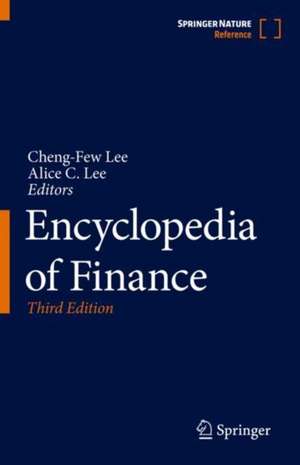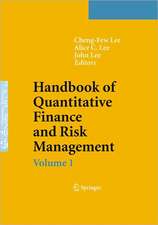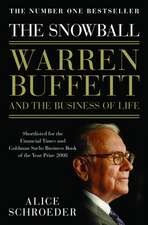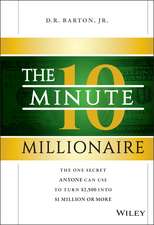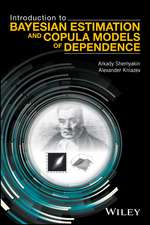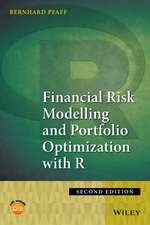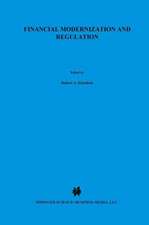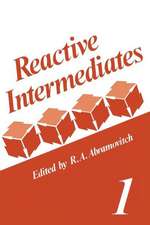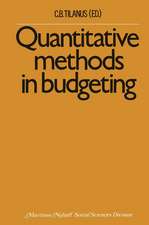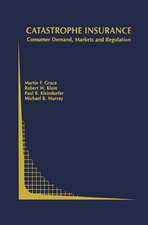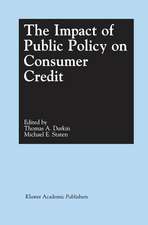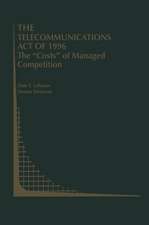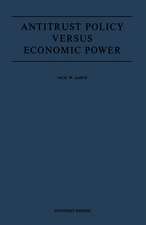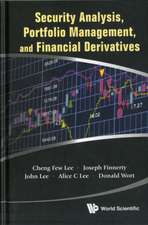Encyclopedia of Finance: Encyclopedia of Finance
Editat de Cheng-Few Lee, Alice C. Leeen Limba Engleză Hardback – 31 aug 2022
| Toate formatele și edițiile | Preț | Express |
|---|---|---|
| Hardback (2) | 3378.08 lei 38-44 zile | |
| Springer International Publishing – 31 aug 2022 | 3378.08 lei 38-44 zile | |
| Springer Us – 6 feb 2013 | 3935.28 lei 38-44 zile |
Preț: 3378.08 lei
Preț vechi: 4444.85 lei
-24% Nou
Puncte Express: 5067
Preț estimativ în valută:
646.40€ • 676.60$ • 538.01£
646.40€ • 676.60$ • 538.01£
Carte tipărită la comandă
Livrare economică 26 martie-01 aprilie
Preluare comenzi: 021 569.72.76
Specificații
ISBN-13: 9783030912307
ISBN-10: 3030912302
Pagini: 2782
Ilustrații: XXX, 2782 p. 195 illus., 97 illus. in color. In 3 volumes, not available separately.
Dimensiuni: 155 x 235 mm
Greutate: 5.94 kg
Ediția:3rd ed. 2022
Editura: Springer International Publishing
Colecția Springer
Seria Encyclopedia of Finance
Locul publicării:Cham, Switzerland
ISBN-10: 3030912302
Pagini: 2782
Ilustrații: XXX, 2782 p. 195 illus., 97 illus. in color. In 3 volumes, not available separately.
Dimensiuni: 155 x 235 mm
Greutate: 5.94 kg
Ediția:3rd ed. 2022
Editura: Springer International Publishing
Colecția Springer
Seria Encyclopedia of Finance
Locul publicării:Cham, Switzerland
Cuprins
Terms and Essays.- Deposit Insurance Schemes.- Gramm-Leach-Bliley Act: Creating a New Bank for a New Millennium.- Pre-funded Coupon and Zero-Coupon Bonds: Cost of Capital Analysis.- Intertemporal Risk and Currency Risk.- Credit Derivatives.- Foreign exchange risk premium and policy uncertainty.- Treasury Inflation-Protected Securities.- Asset Pricing Models.- Conditional Asset Pricing.- Conditional Performance Evaluation.- Working Capital and Cash Flow.- Evaluating Fund Performance Within the Stochastic Discount Factor Framework.- Duration Concepts, Analysis, and Applications.- Loan Contract Terms.- Chinese A and B Shares.- Decimal Trading in the U.S. Stock Markets.- The 1997 NASDAQ Trading Rules.- Reincorporation.- Mean Variance Portfolio Allocation.- Online Trading.- A Critical Evaluation of the Portfolio Performance Indices Under Rank Transformation.- Corporate Failure: Definitions, Methods, and Failure Prediction Models.- Main Bank Relationships, Debt Structure, and Innovation in Japan.- Term Structure: Interest Rate Models .- Review of REIT and MBS.- Experimental Economics and the Theory of Finance.- Merger and Acquisition: Definitions, Motives, and Market Responses.- Multistage Compound Real Options: Theory and Application.- Market Efficiency Hypothesis.- The Microstructure/Micro-Finance Approach to Exchange Rates.- Arbitrage and Market Frictions.- Fundamental Tradeoffs in the Publicly Traded Corporation.- The Mexican Peso Crisis.- Methods for Portfolio Performance Evaluation.- Call Auction Trading.- Market Liquidity.- Market Makers.- Structure of Securities Markets.- Accounting Scandals and Implications for Directors: Lessons from Enron.- Agent-Based Models of Financial Markets.- The Asian Bond Market.- Cross-Border Mergers and Acquisitions.- Jump Diffusion Model.- Networks, Nodes, and Priority Rules.- The Momentum Trading Strategy.- Equilibrium Credit Rationing and Monetary Nonneutrality in a Small Open Economy.- Policy Coordination Between Wages and Exchange Rates in Singapore.- The Le Chatelier Principle of the Capital Market Equilibrium.- MBS Valuation and Prepayments.- The Impacts of IMF Bailouts in International Debt Crises.- Corporate Governance: Structure and Consequences.- A Survey Article on International Banking.- Hedge Funds: Overview, Strategies, and Trends.- An Appraisal of Modeling Dimensions for Performance Appraisal of Global Mutual Funds.- Structural Credit Risk Models: Endogenous Versus Exogenous Default.- Arbitrage Opportunity Set and the Role of Corporations.- Equity Premium Puzzle: The Distributional Approach.- Understanding Ginnie Mae Reverse Mortgage H-REMICs: Its Programs and Cashflow Analysis.- An Analysis of Risk Treatment in the Field of Finance.- The Trading Performance of Dynamic Hedging Models: Time Varying Covariance and Volatility Transmission Effects.- Portfolio Insurance Strategies.- Time-Series and Cross-Sectional Tests of Asset Pricing Models.- Unified Model Arbitrage-free Term Structure of Flow Risks.-A Comparison of Formulas to Compute Implied Standard Deviation.- Securities Transaction Taxes: Literature and Key Issues.- Financial Control and Transfer Pricing.- Alternative Models for Evaluating Convertible Bond: Review and Integration.- A Rationale for Hiring Irrationally Overconfident Managers.- The Statistical Distribution Method, the Decision-Tree Method and Simulation Method for Capital Budgeting Decisions.- Valuation of Interest Tax Shields.- Usefulness of Cash Flow Statements.- Do CEO Gender and Marital Status Affect Firm’s R&D and Value? An Empirical Analysis Using Nonlinear Models.- Three alternative methods for estimating hedge ratios.- Credit Risk Modeling: A General Framework.- Bankruptcy prediction studies across countries using Multiple Criteria Linear Programming (MCLP) data mining approaches.- Application of Difference-in-Differences Strategies in Finance: The Case of Natural Disasters and Bank Responses.- Financial Panel Data Models, Strict versus Contemporaneous Exogeneity, and Durbin-Wu-Hausman Specification Tests.- Accruals and the Asymmetric Timeliness of Earnings: a Decomposition Analysis.- Computer Technology for Financial Service.- Local Volatility Interest Rate Model.- Applications of logistic regression and hazard method in accounting and finance research.- Cube Root Utility Theory.- A Global Comparative Study of Impact Investments Research in Academic Institutions.- Financial Crisis, Capital Requirement and Stress Tests: Evidence from the Extreme Value and Stable Paretian Estimates.- The Economics of and Accounting for Lease Transactions.- Pension accounting, inside Debt, and capital structure.- The Role of Earnings Management in Equity Valuation.- The applications of machine learning in accounting and auditing research .- Internal capital budgeting and allocation in financial firms.- Job Security and CEO Compensation.- Tail-risk protection: Machine Learning meets modern Econometrics.- Structural Breaks in Financial Panel Data.- More on Equilibrium Credit Rationing and Interest Rates: A Theory with New Evidence.- The effect of Basel III on banks' lending.- Mortgage Analysis.- A History of Commercially Available Risk Models.- Short Selling Activity and Effects on Financial Markets and Corporate Decisions.- Simultaneous Equation Models for Financial Planning and Forecasting.- Alternative errors-in-variables models and their applications in finance research.- Optimal Payout Ratio under Uncertainty and the Flexibility Hypothesis: Theory and Empirical Evidence.- Mergers and Acquisitions: Principles and Practices.- Accrual Accounting and Risk: Abnormal Sales Growth and Accruals Quality and Returns.- Applications of Book-Tax Difference in Accounting and Finance Research.- Evaluating Portfolio Risk Management: A New Evidence from DCC Models and Wavelet Approach.- Cash Conversion Cycle and Corporate Performance: Global Evidence.- How Consistent are the Judges of Portfolio Performance?.- Entropy and the Value of Information for Investors.- A Fuzzy Real Option Valuation Approach To Capital Budgeting Under Uncertainty Environment.
Notă biografică
Professor Cheng-Few Lee is a Distinguished Professor of Finance at Rutgers Business School, Rutgers University and was chairperson of the Department of Finance from 1988–1995. He has also served on the faculty of the University of Illinois (IBE Professor of Finance) and the University of Georgia. He has maintained academic and consulting ties in Taiwan, Hong Kong, China and the United States for the past three decades. He has been a consultant to many prominent groups including, the American Insurance Group, the World Bank, the United Nations, The Marmon Group Inc., Wintek Corporation, and Polaris Financial Group.
Professor Lee founded the Review of Quantitative Finance and Accounting (RQFA) in 1990 and the Review of Pacific Basin Financial Markets and Policies (RPBFMP) in 1998, and serves as managing editor for both journals. He was also a co-editor of the Financial Review (1985–1991) and the Quarterly Review of Economics and Finance (1987–1989). In the past 47 years, Dr. Lee has written numerous textbooks ranging in subject matters from financial management to corporate finance, security analysis and portfolio management to financial analysis, planning and forecasting, and business statistics. In addition, he edited two popular books, Encyclopedia of Finance (with Alice C. Lee) and Handbook of Quantitative Finance and Risk Management (with Alice C. Lee and John Lee). Dr. Lee has also published more than 220 articles in more than 20 different journals in finance, accounting, economics, statistics, and management. Professor Lee was ranked the most published finance professor worldwide during the period 1953–2008.
Professor Lee was the intellectual force behind the creation of the new Masters of Quantitative Finance program at Rutgers University. This program began in 2001 and has been ranked as one of the top fifteen quantitative finance programs in the United States. Professor Lee started the Conference on Financial Economics and Accounting. This conference is a consortium of Rutgers University, New York University, Temple University, University of Maryland, Georgia State University, Tulane University, Indiana University, and University of Toronto. This conference is the most well-known conference in finance and accounting.
Alice C. Lee is currently a Vice President in the Model Validation Group, Enterprise Risk Management, at State Street Corporation (USA). She was an Assistant Professor of Finance at San Francisco State University (USA). She has over 20 years of experience and a diverse background, which includes academia, engineering, sales, and management consulting. Her primary areas of teaching and research are corporate finance and financial institutions.
Professor Lee founded the Review of Quantitative Finance and Accounting (RQFA) in 1990 and the Review of Pacific Basin Financial Markets and Policies (RPBFMP) in 1998, and serves as managing editor for both journals. He was also a co-editor of the Financial Review (1985–1991) and the Quarterly Review of Economics and Finance (1987–1989). In the past 47 years, Dr. Lee has written numerous textbooks ranging in subject matters from financial management to corporate finance, security analysis and portfolio management to financial analysis, planning and forecasting, and business statistics. In addition, he edited two popular books, Encyclopedia of Finance (with Alice C. Lee) and Handbook of Quantitative Finance and Risk Management (with Alice C. Lee and John Lee). Dr. Lee has also published more than 220 articles in more than 20 different journals in finance, accounting, economics, statistics, and management. Professor Lee was ranked the most published finance professor worldwide during the period 1953–2008.
Professor Lee was the intellectual force behind the creation of the new Masters of Quantitative Finance program at Rutgers University. This program began in 2001 and has been ranked as one of the top fifteen quantitative finance programs in the United States. Professor Lee started the Conference on Financial Economics and Accounting. This conference is a consortium of Rutgers University, New York University, Temple University, University of Maryland, Georgia State University, Tulane University, Indiana University, and University of Toronto. This conference is the most well-known conference in finance and accounting.
Alice C. Lee is currently a Vice President in the Model Validation Group, Enterprise Risk Management, at State Street Corporation (USA). She was an Assistant Professor of Finance at San Francisco State University (USA). She has over 20 years of experience and a diverse background, which includes academia, engineering, sales, and management consulting. Her primary areas of teaching and research are corporate finance and financial institutions.
Textul de pe ultima copertă
Caracteristici
Provides of over 1,300 individual definitions, chapters, appendices Provides comprehensive knowledge of finance in terms of theory and application Showcases contributions from an international array of experts
Recenzii
From the reviews of the second edition:
“The 2,400 definitions in the Encyclopedia of Finance … could stand alone as a valuable reference for both practitioners and academics. … this excellent reference is targeted at university, corporate, and finance department libraries. With so much terminology to master in the increasingly complex field of finance, the Encyclopedia of Finance constitutes a valuable resource for those in need of a quick definition or formula as well as a vehicle for those wishing to dig more deeply into any of a wide range of topics.” (Ronald L. Moy, CFA Institute, cfapubs.org, February, 2014)
“It is aimed at … students and researchers and lecturers ‘as supplementary material’. … Every essay has a bibliography worth pursuing. … There is a comprehensive subject index … and an author index for those interested in citations and references. … for courses and research where a wide range of quantitative advice and methodology needs to be on show, it containsa wealth of useful and indicative material. For the specialist, then, worth the outlay.” (Stuart Hannabuss, Reference Reviews, Vol. 27 (7), 2013)
“The 2,400 definitions in the Encyclopedia of Finance … could stand alone as a valuable reference for both practitioners and academics. … this excellent reference is targeted at university, corporate, and finance department libraries. With so much terminology to master in the increasingly complex field of finance, the Encyclopedia of Finance constitutes a valuable resource for those in need of a quick definition or formula as well as a vehicle for those wishing to dig more deeply into any of a wide range of topics.” (Ronald L. Moy, CFA Institute, cfapubs.org, February, 2014)
“It is aimed at … students and researchers and lecturers ‘as supplementary material’. … Every essay has a bibliography worth pursuing. … There is a comprehensive subject index … and an author index for those interested in citations and references. … for courses and research where a wide range of quantitative advice and methodology needs to be on show, it containsa wealth of useful and indicative material. For the specialist, then, worth the outlay.” (Stuart Hannabuss, Reference Reviews, Vol. 27 (7), 2013)
